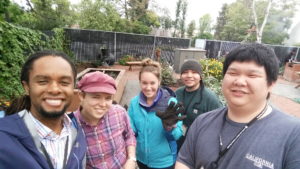Second, Christians might become vegan in order to enable fellow creatures to flourish, to praise God each in their particular way. The vast majority of farmed animals are raised in industrial systems that subject them to unnecessary suffering and impoverished lives in which they cannot thrive and glorify God. Most fish now come from intensive farmed environments, or if wild-caught, are subjected to unsustainable fishing practices and long drawn-out deaths. The large-scale production of dairy and eggs entails killing male animals surplus to requirements and female animals once their productivity declines. These are powerful reasons for adopting a vegan diet, rather than just a vegetarian one. Current production levels of animals for consumption inhibit the flourishing of wild animals as well as domesticated animals. By 2000, the biomass of domesticated animals exceeded that of all wild land mammals by 24 times. The biomass of domesticated chickens alone is nearly three times that of all wild birds. These shocking statistics show that humans are monopolizing the productive capacity of the earth in a way that leaves very little space for wild animals at all, which is part of what is driving their mass extinction.
Third, Christians might shift to a vegan diet in order to save the lives of fellow human creatures. The livestock industry threatens human food and water security, and those already suffering from deprivation are at greatest risk. Christians are explicitly directed to care for those with the greatest needs and the least resources. Currently, over a third of global cereal output goes to farmed animals and humans eating the animals receive only 8% of the calories that would be available if humans ate the cereals directly. Animal agriculture is also a very significant consumer of scarce global water supplies: producing 1 kg of beef requires 10 to 20 times the water required by producing the same calories from plant-based sources. While a vegan diet is not immediately practical in every part of the world (for Siberian pastoralists reliant on reindeer herds, for example), it is very clear that the global human population, as well as animals and the environment, would benefit from a transition towards using plant-based foods wherever possible.
Fourth, Christians might adopt a vegan diet in order to sustain the health and well-being of their families, friends, neighbours, and wider society. The unprecedentedly high levels of meat and other animal products consumed in developed nations directly damages human health (increased incidence of heart disease, cancer, type 2 diabetes, and strokes). In addition, intensive farming practices contribute to both the rise of antibiotic-resistant bacterial strains and the risk of pandemics from zoonotic diseases such as swine and bird flu.
Finally, many Christians will be inspired by the long Christian traditions of fasting from meat and other animal products, on Fridays, during Lent, and at other times. Many Coptic Christians today observe fasts imposing a vegan diet for two-thirds of the year. The practice of not eating animal products can be understood as part of a penitential practice that redirects one’s focus away from selfish pleasure and towards God. Such traditions remind Christians of the limits that come with recognizing God as creator: animals belong to God, so humans must treat them with respect and can’t do whatever we want with them.
Christians often note arguments against vegetarianism or veganism, but these concerns do not end the conversation. Genesis 1 identifies human beings as uniquely images of God and grants them dominion over other animals, but the end of the chapter prescribes a vegan diet for humans, so this original dominion does not include permission to kill animals for food. In Genesis 9, following the flood, God allows humans to kill animals for food, but this does not justify modern patterns of raising animals in industrial systems in ways that are so clearly damaging for humans, animals, and the wider environment. Gospel accounts record Jesus as eating fish and offering fish to others (although, interestingly, he is not recorded as eating mammals or poultry), but whatever his practice, it does not justify eating the products of modern industrial animal agriculture. Some of these concerns suggest that would be implausible to claim that a vegan diet should be an absolute obligation for all Christians. They do not show that it is inappropriate to adopt a vegan diet as a response to the broad concerns noted above that relate to the modern context of raising animals for food where there are readily available alternative sources of nutrition.
It is important to note that veganism in a Christian context should never be presented as a moral utopia. Christians recognize a brokenness in our relationships with fellow creatures which cannot be overcome by adopting a particular dietary practice or by any other effort we can make. Vegan Christians should not make claims to moral superiority: they are sinners like everyone else. They are simply seeking to act as responsibly as they can in this aspect of the choices they make about what to eat. They should hope to learn from fellow Christians about better ways of living in other areas of their lives, just as they may hope that fellow Christians may be open to learning from their practice.
Concern for fellow humans, fellow animal creatures, and the environment are obligations for Christians, and so the impacts of modern animal agriculture should trouble all Christians. It’s important to realize that farmers are not the villains here: farmers are often pressured into systems of poor farmed animal welfare because of the popular desire for cheap animal products and the retailers' power to determine pricing for their own advantage. A Christian vision of delighting in God’s world and living responsibly among the fellow creatures God loves will be an inspiration to many Christians to adopt a vegan diet.
This article was originally posted on The Vegan Society’s website.







